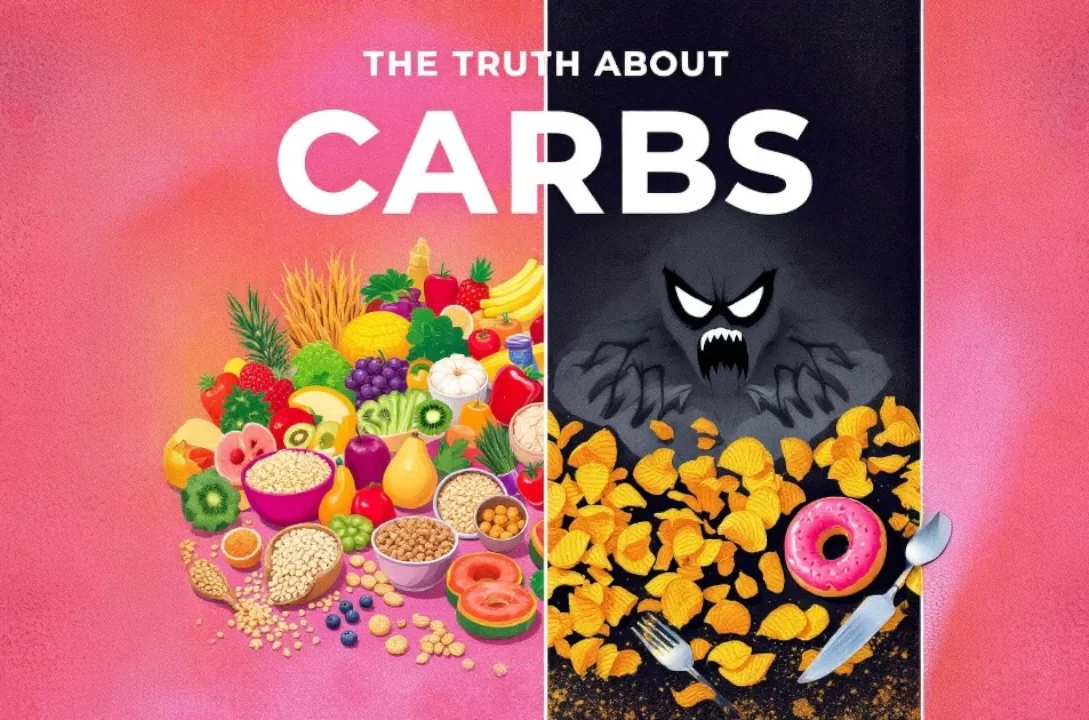Carbohydrates have been demonized by fad diets and weight-loss trends for years. From keto to Atkins, carbs are often painted as the villain behind weight gain, fatigue, and poor health. But is this reputation deserved—or are we missing the bigger picture?
The truth is, not all carbs are created equal. While processed sugars and refined grains can harm your health, whole, unprocessed carbohydrates fuel your brain, support digestion, and provide long-lasting energy.
This article cuts through the confusion, separating carb myths from facts and revealing how to make smart carb choices for optimal health.
What Are Carbohydrates, Really?
Carbohydrates are one of the three macronutrients (along with protein and fat) that provide energy. They break down into glucose, your body’s primary fuel source.
The Three Main Types of Carbs
- Sugars (Simple Carbs): Fast-digesting carbs found in fruits, honey, and processed sweets.
- Starches (Complex Carbs): Slower-digesting carbs in grains, potatoes, and legumes.
- Fiber (Indigestible Carbs): Supports gut health and slows sugar absorption.
Your body needs carbs to function—especially your brain, which runs almost entirely on glucose.
Why Carbs Got a Bad Reputation
The anti-carb movement took off with low-carb diets promising rapid weight loss. But much of the fear stems from misconceptions:
Common Carb Myths Debunked
- “Carbs make you fat.” → Excess calories (from any source) cause weight gain.
- “All carbs spike blood sugar.” → Fiber-rich carbs digest slowly, stabilizing glucose.
- “Humans don’t need carbs.” → While the body can use fat for fuel (ketosis), carbs remain the most efficient energy source.
Research from the Harvard School of Public Health confirms that whole carbs (like oats and quinoa) are linked to better long-term health.
Good Carbs vs. Bad Carbs: How to Tell the Difference
Not all carbs are equal. The key is choosing nutrient-dense, fiber-rich sources over processed junk.
Best Carb Choices
✔ Whole grains – Brown rice, quinoa, oats
✔ Legumes – Lentils, chickpeas, black beans
✔ Vegetables – Sweet potatoes, squash, leafy greens
✔ Fruits – Berries, apples, bananas (in moderation)
Worst Carb Choices
✖ Refined grains – White bread, pastries, white pasta
✖ Added sugars – Soda, candy, sugary cereals
✖ Processed snacks – Chips, crackers, instant noodles
A British Medical Journal study found that refined carbs increase heart disease risk, while whole carbs lower it.
How Carbs Affect Your Body (The Science)
Carbohydrates impact everything from energy levels to gut health.
Brain Function
Your brain uses ~120g of glucose daily. Low-carb diets may cause brain fog and fatigue.
Exercise Performance
Carbs fuel muscles during high-intensity workouts. Athletes often “carb-load” for endurance events.
Gut Health
Fiber feeds beneficial gut bacteria, reducing inflammation and improving digestion.
Mood and Mental Health
Low-carb diets may increase cortisol (stress hormone) and reduce serotonin (the “happy” chemical).
Who Should Limit Carbs—And Who Needs More
Carb needs vary by individual.
Who Might Benefit From Lower Carb Intake?
- People with insulin resistance or type 2 diabetes
- Those following keto for medical reasons (e.g., epilepsy)
Who Needs More Carbs?
- Athletes and active individuals
- Pregnant or breastfeeding women
- People with fast metabolisms
The American Diabetes Association now emphasizes carb quality over quantity for blood sugar control.
How to Eat Carbs Without Guilt
You don’t have to fear carbs—just choose wisely.
Smart Carb Strategies
- Pair carbs with protein/fat (e.g., apple + almond butter) to slow digestion.
- Prioritize fiber – Aim for 25–30g daily.
- Time carbs around activity – Eat them pre/post-workout for energy.
- Avoid “naked carbs” – Skip sugary foods without fiber or nutrients.
FAQs
Do carbs cause belly fat?
Excess calories (from any source) contribute to fat storage. Refined carbs may increase visceral fat, but whole carbs don’t.
Are low-carb diets safe long-term?
For most people, very low-carb diets are unnecessary and hard to sustain. Balance is key.
What’s the best carb for weight loss?
Fiber-rich options like lentils, quinoa, and vegetables keep you full longer.
Are fruits too high in sugar?
Whole fruits contain fiber, slowing sugar absorption. They’re far healthier than candy or soda.
Can I eat carbs at night?
Yes! Unless you’re diabetic, evening carbs won’t automatically cause weight gain.
Final Thoughts
Carbs aren’t the enemy—processed and refined carbs are. By choosing whole, nutrient-dense sources, you can enjoy carbs without guilt while supporting energy, brain health, and digestion.
Action Step: Swap one refined carb (like white bread) for a whole-grain alternative today and notice how you feel!















